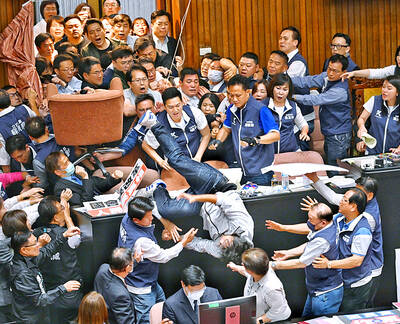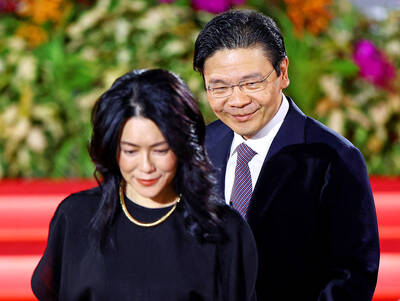US Secretary of State Condoleezza Rice brokered a deal on Gaza border crossings in marathon talks with Israel and the Palestinians yesterday, scoring a rare breakthrough in Middle East diplomacy.
Rice, who put her own reputation at stake by investing so personally in the negotiations, had postponed her departure to Asia for an APEC meeting, staying in Jerusalem an extra day until she secured an agreement on opening the Gaza-Egypt border.
Access to Gaza is key to strengthening the impoverished strip's economy and giving a boost to chances for peacemaking following Israel's withdrawal from the territory in September after 38 years of occupation.
Bleary-eyed after an almost sleepless night of hard-nosed bargaining, Rice -- on her fourth visit to the region this year -- praised the deal as a "good step forward." It hands the Palestinians control of a border for the first time.
"This agreement is intended to give the Palestinian people the freedom to move, to trade, to live ordinary lives," she told a news conference in Jerusalem before flying out.
Rice said the Rafah crossing between Gaza and Egypt, the strip's gateway to the outside world, should open on Nov. 25 with the presence of EU security monitors.
Palestinians would also be able to start traveling in bus and truck convoys between Gaza and the occupied West Bank within months, and construction of a Gaza seaport would begin.
Israel had conditioned the opening of Rafah on its ability to monitor goods and people passing through, saying it feared arms smuggling across the border to Palestinian militants. Palestinians had insisted that Israelis not be at Rafah.
An Israeli Defense Ministry source said a compromise was reached whereby a coordination center manned by Palestinians, Israelis and EU observers will be set up at Kerem Shalom, to which video images and data will be transmitted in real time.
Israel, which has kept control of Gaza's borders, air space and sea lanes since its withdrawal, has been under US pressure to reopen the Rafah crossing, mostly closed since September. Sporadic violence despite a ceasefire has dented peace hopes.
US officials had voiced frustration with what they viewed as the failure of both sides to capitalize on the Gaza withdrawal, the first removal of settlements by Israel from land Palestinians want for a state.
In a sign of tensions, President Mahmoud Abbas, in a speech after the Gaza deal was unveiled, accused Israel of trying to avoid peace talks and incite Palestinian civil war by insisting that militants be disarmed before any negotiations on statehood.
During her visit, Rice renewed US pressure on Abbas to act against armed groups. She also pressed Prime Minister Ariel Sharon, who has vowed that Israel will keep large West Bank settlement blocs forever, to freeze settlement expansion.
Both sides had previously agreed to EU observers at Rafah, and differences centred on Israeli monitoring of the crossing.
Israel, fearing militants could take advantage of its lack of presence to smuggle weapons, wanted to monitor movements via a direct, real-time video feed. Palestinians had objected to that as an impingement on their sovereignty but compromised on a joint monitoring operation.

MUSICAL INTERLUDE: During the altercations, KMT Legislator Hsu Chiao-hsin at one point pulled out a flute and started to play the national anthem A massive brawl erupted between governing and opposition lawmakers in the main chamber of the legislature in Taipei yesterday over legislative reforms. President-elect William Lai (賴清德) is to be inaugurated on Monday, but his Democratic Progressive Party (DPP) lost its majority in the legislature and the Chinese Nationalist Party (KMT) has been working with the Taiwan People’s Party (TPP) to promote their mutual ideas. The opposition parties said the legislative reforms would enable better oversight of the Executive Yuan, including a proposal to criminalize officials who are deemed to make false statements in the legislature. “The DPP does not want this to be

Singapore yesterday swore in Lawrence Wong (黃循財) as the city-state’s new prime minister in a ceremony broadcast live on television after Lee Hsien Loong (李顯龍) stepped down following two decades in office. Wong, formerly deputy prime minister, was inaugurated at the Istana government office shortly after 8pm to become the second person outside the Lee family to lead the nation. “I ... do solemnly swear that I will at all times faithfully discharge my duties as prime minister according to law, and to the best of my knowledge and ability, without fear or favor, affection or ill-will. So help me God,” the

A group of 30 foreign academics yesterday released a statement condemning legislative reforms proposed by opposition lawmakers, saying they are unconstitutional and undermine the objective of good governance. The statement publicized at a news conference in Taipei is cosigned by international academics, journalists and politicians, including former American Institute in Taiwan directors William Stanton and Stephen Young, and Formosan Association for Public Relations president Bob Yang (楊英育). The Chinese Nationalist Party (KMT) and Taiwan People’s Party (TPP) have put forward a set of legislative reforms that would introduce “contempt of legislature” charges, require the president to answer lawmakers’ questions and expand the

PURSUING PEACE: As the new president took office, he reiterated Taiwan’s sovereignty while saying that the nation must cooperate with other democracies President William Lai (賴清德) in his inaugural speech yesterday called on Beijing to acknowledge Taiwan’s government and engage in dialogue with Taipei, saying that both sides are responsible for promoting peace in the Taiwan Strait. “I hope that China will face the reality of the Republic of China’s existence” and “in good faith ... engage in cooperation with the legal government chosen by Taiwan’s people,” Lai said in front of the Presidential Office Building in Taipei. Lai reaffirmed that his government would adhere to former president Tsai Ing-wen’s (蔡英文) policy toward China and work to maintain the “status quo.” Lai advocated for dialogue